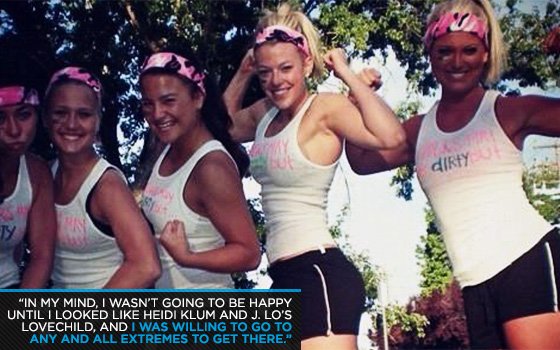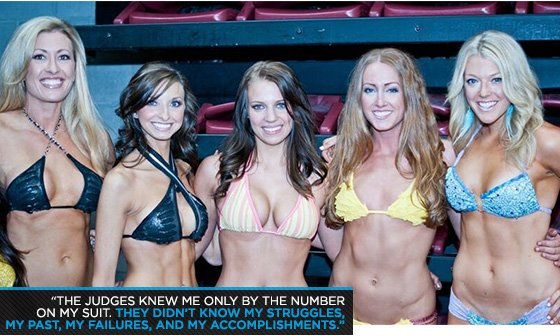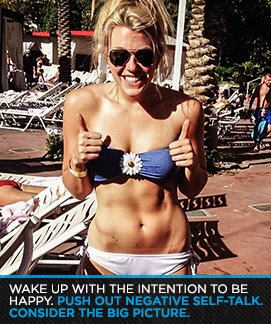The majority of our life is measured in numbers. Some people choose to look at the number of dollars in their bank account, the number of places they've visited, or the number of years it took them to reach a goal.
Other people choose to look at more personal numbers—the number of dates they've waited before that first kiss, the number of days left till a beach vacation, or the number grade they receive on a term paper.
The numbers I spent a good chunk of my life focusing on were of a very particular sort— the number of calories I consumed, the number of calories I burned, and the positive or negative number that resulted. These numbers preoccupied my days, months, and years. Eventually, those numbers began to consume my entire life.
I'm not sure exactly sure when my obsession with numbers first started. I remember keeping a food journal at age 8, giving myself stickers on the days I kept it to 10 lines or less, and beating myself up over the days I didn't. I remember skipping football games in high school to make time for the gym, hitting the volleyball court early so I could run laps before practice, and spending my allowance on workout tapes I'd follow to exhaustion.

Ironically, I had more confidence than most girls my age. I saw my worth in other aspects of my life, but I couldn't seem to find it in the image in the mirror. In my mind, I wasn't going to be happy until I looked like Heidi Klum and JLO's lovechild, and I was willing to go to any and all extremes to get there. I dieted, exercised, starved, binged, purged, and took measurements.
I spent my nights creating 1,100-1,200 calorie meal plans. I told myself, "Nothing tastes as good as skinny feels." I ran four half marathons in four weeks. This was my life, and it was exhausting.
One of the first times the severity of my situation started becoming clear to me was in college. All the girls in my graduate program met on Monday nights to watch The Bachelor, and each of us would take turns making dinner. For nearly two seasons, I came up with excuses not to join the group for dinner. I'd strategically show up late, say I wasn't hungry, or pretend I'd eaten dinner right before.

I remember one Monday I was starving, but, after checking my calorie tracker, I decided it wasn't worth trying to make their dinner fit into my macros. I downed a protein shake and stared up at the clock until 10 minutes after the hour. The show had started, the girls had dished, and I was safe.
As I was driving over, I tried to convince myself that this was normal. "It's going to help you reach your goals," I told myself. "You live a different lifestyle than they do. They'll never understand if you try to explain."
At the time, I was preparing for a competition. I convinced myself that if I could just get stage ready—lean enough, vascular enough, and conditioned enough—I'd finally be enough. I never strayed from my diet, always documented my fluids, macros, and supplements, and made all my workouts. Still, when Saturday weigh-in would come around, a panic-attack would strike.
I told myself I'd never be ready, sculpted, lean, or buff enough. Finally, one morning, I woke up and had enough.
I didn't really have one solid "aha" moment, but instead benefited from the maturity that comes with getting older, accepting your body, and striving for a positive mindset. My mind reached a fork in the road, and I realized I couldn't do this anymore. I was drained: physically, emotionally, mentally. There was nothing left.
I looked at myself through the same eyes I would use to look at someone I loved. I loved every single thing that competition judges would tell me I needed to change—every curve, every line, every sun-kissed freckle, and every flaw. The judges knew me only by the number on my suit. They didn't know my struggles, my past, my failures, and my accomplishments. They probably didn't even know my name.

When it came to working out, I used to focus on the parts of my body that I wanted to change rather than focusing on my strengths. Now, rather than saying, "I hate my shoulders," I say, "I love my shoulders, but I can't wait until I can shoulder press 40s unassisted." There's no greater feeling than setting a goal and demolishing it.
Don't get me wrong, I respect and admire the hard work and dedication of fitness competitors, but I also think it's easy to be consumed and lose yourself in the process. My hobby became my sole identity. Without it, I felt as though I had nothing left. Contest prep, weight, and numbers became my life even when I wasn't preparing for anything. The unhealthy mindset I'd developed yielded unhealthy habits, unhealthy routines, and unhealthy relationships between the voice in my head and the reflection in the mirror.
It wasn't until I stepped out of my world that I recognized the beauty in our world.
Rather than continuing the robotic routine of never-changing workouts and diets, I took a minute to evaluate why I loved working out so much. It wasn't about the weigh-ins and judging. I love forgetting about my problems while running sprint intervals that made my legs feel like jello. I love pushing my limits, setting new PRs, and leaving all my worries on the weight room floor. I love being strong.
I still love all those things, but, now, I love living my entire life. I love finding the balance within myself to have a glass of wine with my sister, take my niece and nephew to TCBY for Waffle Cone Wednesday, or grab a guilt-free hamburger at a family barbecue. I love being able to plan a vacation without packing exercise bands or worrying whether the hotel has a gym.

I love exercising my mind, emotions, and intellect just as much as—if not more than—exercising my body. I've always been a creative person, but my preoccupation with numbers, weight, measurements, and workouts subdued that side of me.
Now that I've found balance, writing has been a stress release on par with a sweat-soaked workout. I've been able to find comfort in vulnerability, tap into my inner strength, and connect with people on a deeper level that looks past superficial, insignificant details.
The minute I started focusing on goals rather than hating specific body parts, results followed.
I challenge you, this very second, to wake up.
In the past, I believed that the ultimate exercise of self-control was in restriction and extremes. If you were going to train, train like a competitor. If you were going to diet, never give into cravings. Don't cheat, don't skip a workout, and don't even think about having a slice of cake.
Now, I know better.
There's more to self-control than not eating everything in sight or being strict with your workouts. Self-control also means controlling your thoughts, understanding where your priorities lie, and realizing that sometimes friends and family deserve more attention than your macros.
Self-control means understanding that there will always be another goal to reach, dream to chase, and limit to push, and yet still choosing to enjoy the now.
5 Tips To Help You Achieve Balance
1 / Take a Break

Too much of a good thing isn't always positive. Take a breather every once in a while to recharge, refuel, and re-evaluate your goals. Ask yourself: What has gotten me where I am today? What are my aspirations? What will it take to reach them?
Set mini-targets to help you meet long-term goals, and celebrate smaller victories instead of placing so much weight on future outcomes.
Take a moment to write down what you've already accomplished, and, instead of placing all the emphasis on where you want to be, remember how far you've already come.
2 / Write It Down
Writing is a wonderful way to organize your thoughts, center yourself, and allow feelings you mask to come to light. Not sure where to start? Begin with one of the following prompts: In 10 years, I hope to have accomplished … If I died tomorrow, I would hope to be remembered for … The 5 things in my life that bring me the most joy are.
3 / Change It Up
We all get stuck in a rut from time to time, and our fitness and nutrition routines are no different. Seek out ways to reignite your passion and fuel your goals. Find a new workout from your favorite athlete, try a new recipe, or change the scenery with an outdoor workout.
4 / Practice Positivity
Our thoughts are influential, so strive for a positive mindset. Wake up with the intention of being happy, and push out negative self-talk by considering the bigger picture. Put things in perspective by asking yourself "Will this problem matter 10 years from now?" Still overwhelmed? Step away from the situation for some breathing room, belt the lyrics to your favorite song, or call someone up for a chat.
5 / Loosen the Reigns
We're all our toughest critics, and often we set standards for ourselves that are nearly unattainable. Don't punish yourself about petty details that don't matter. Approach your slip-up the same way you would with a friend or loved one. You ate an extra cookie? It happens, you're human. You skipped a workout last night? It better be because you were taking a bubble bath and enjoying a glass of wine.
If we aren't our best friend, who will be? The longer you spend dwelling on insignificant details, the less time you'll have to experience your bright, beautiful future.

